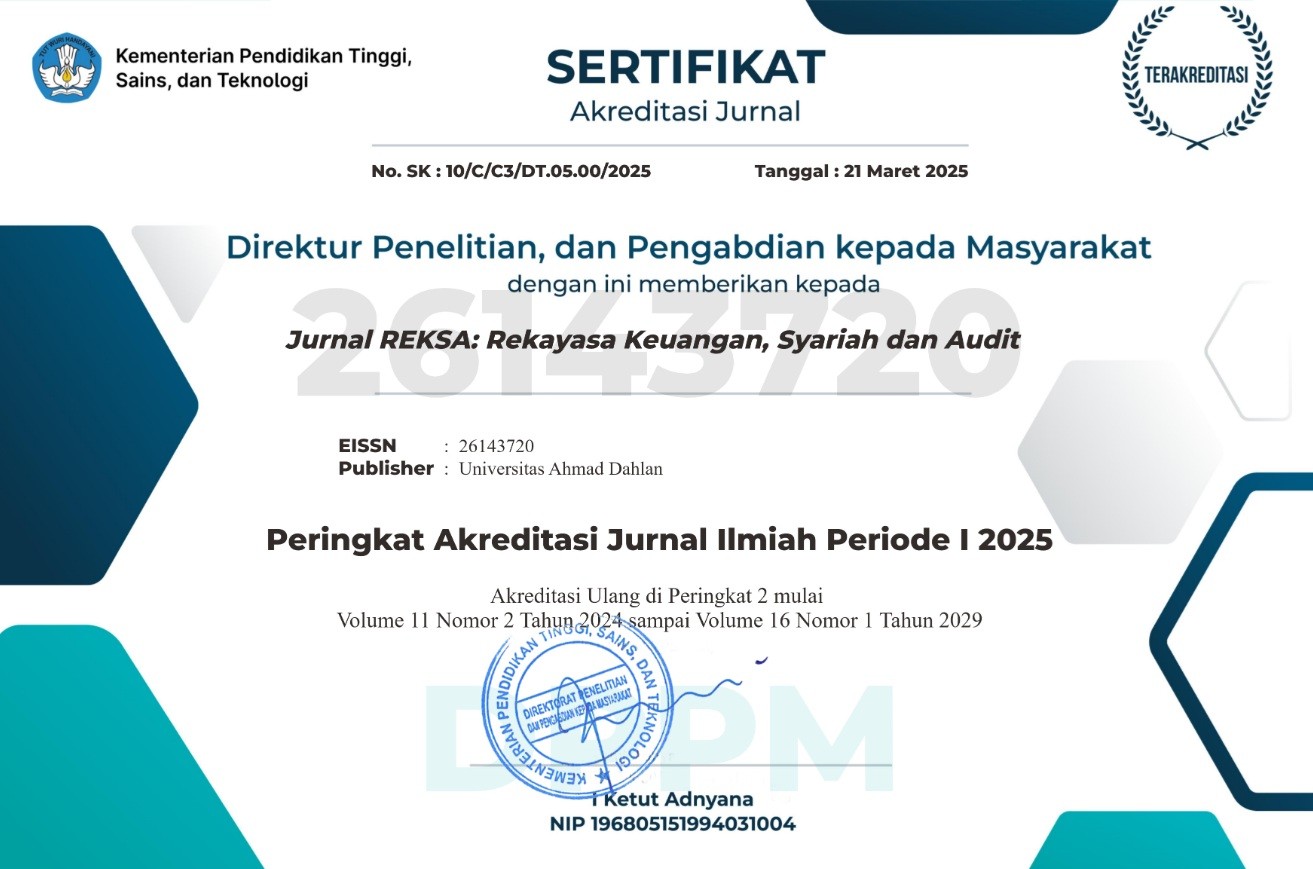The Role of Micro Waqf Bank in Supporting MSMEs through Productive Waqf
DOI:
https://doi.org/10.12928/jreksa.v10i1.7687Keywords:
Micro Waqf Bank, Productive Waqf, MSMEsAbstract
Micro Waqf Bank (Bank Wakaf Mikro–BWM) is an Islamic Microfinance Institution registered and supervised by the Financial Services Authority (OJK), which aims to provide access to capital for small communities who do not yet have access to formal financial institutions. This study aimed to identify the roles of micro waqf banks in supporting MSMEs through productive waqf. It utilized a case study research design focusing on Micro Waqf Bank BWM Usaha Mandiri Sakinah (UNISA). Primary data were collected through interviews with the marketing manager, marketing staff, and BWM Usaha Mandiri Sakinah customers. The results of the qualitative data analysis show that BWM Usaha Mandiri Sakinah, as one of the micro waqf banks, has played an essential role in increasing MSMEs' income in Sleman Yogyakarta.
References
Assegaf, M., & Mursyid, K. (2019). Pelaksanaan Wakaf Produktif di Bank Wakaf Mikro Syariah Denanyar Jombang. MAZAWA: Manajement of Zakah and Waqf, 1(1), 66–78.
Bank Wakaf Mikro (BWM). (2020). Bank Wakaf Mikro (BWM). http://lkmsbwm.id/materi_edukasi
Cahyaningrat, L., & Mongid, A. (2022). Micro Waqf Bank : Combination of Microfinance and Community Development in Islamic Finance. https://doi.org/10.4108/eai.15-9-2021.2315201
Diana, R. (2019). Analisis Aksesibilitas Permodalan Usaha Mikro Kecil Di Provinsi Sumatera Barat. Jurnal Ekonomi Pembangunan, 27(1), 67–80. https://doi.org/10.14203/jep.27.1.2019.67-80
Disemadi, H. S., & Roisah, K. (2019). Kebijakan Model Bisnis Bank Wakaf Mikro Sebagai Solusi Pemberdayaan Ekonomi Masyarakat. Law Reform, 15(2), 179.
Halim, A. (2020). Pengaruh Pertumbuhan Usaha Mikro, Kecil Dan Menengah Terhadap Pertumbuhan Ekonomi Kabupaten Mamuju. Jurnal Ilmiah Ekonomi Pembangunan, 1(2), 157–172. https://stiemmamuju.e-journal.id/GJIEP/article/view/39
Hidayat, S., & Makhrus, M. (2021). Peranan Bank Wakaf Mikro dalam Pemberdayaan Ekonomi Masyarakat di Purwokerto. Jurnal Ilmiah Ekonomi Islam, 7(2), 577–586. https://doi.org/10.29040/jiei.v7i2.2249
KemenkopUKM. (2021). Pemerintah Terus Perkuat UMKM Melalui Berbagai Bentuk Bantuan. Https://Www.Kemenkeu.Go.Id/. https://www.kemenkeu.go.id/publikasi/berita/pemerintah-terus-perkuat-umkm-melalui-berbagai-bentuk-bantuan/
Kholidah, N., & Hakim, M. R. (2018). Peluang dan Tantangan Pengembangan Usaha Mikro Kecil Menengah (UMKM) Dari Berbagai Aspek Ekonomi. Jurnal Ilmiah Manajemen Dan Bisnis, 2(1), 181–197.
Peraturan Otoritas Jasa Keuangan Nomor 62 /pojk.05/2015 tentang Perubahan atas Peraturan Otoritas Jasa Keuangan Nomor 13/POJK.05/2014 tentang Penyelenggaraan Usaha Lembaga Keuangan Mikro, (2015).
Mugiyati, M., Kholis, N., & Azizah, S. N. (2021). The effect of Micro Waqf Bank on the financial inclusion of micro and small enterprises in the pesantren areas. International E-Conference on Business Management (e "Reforming Business Management in Digital Era", November, 78–85. http://repository.uinsby.ac.id/id/eprint/1896/%0Ahttp://repository.uinsby.ac.id/id/eprint/1896/1/PAPER_10.pdf
Nur, M. A., Muharrami, R. S., & Arifin, M. R. (2019). Peranan Bank Wakaf Mikro dalam Pemberdayaan Usaha Kecil pada Lingkungan Pesantren. Journal of Finance and Islamic Banking, 2(1), 25. https://doi.org/10.22515/jfib.v2i1.1806
Rahman, M., & Widayanti, D. (2021). Pengaruh Pembiayaan Bank Wakaf Mikro Terhadap Peningkatan Kesejahteraan Ekonomi Nasabah ( Studi Kasus Bank Wakaf Mikro Maslahah Syubbanul Wathon Magelang ). Jurnal Nuansa Akademik: Jurnal Pembangunan Masyarakat, 6(2), 139–154.
Undang-Undang Republik Indonesia Nomor 1 Tahun 2013 Tentang Lembaga Keuangan Mikro, (2013).
Rizki, M., Sari, N., & Widjayanti, A. (2022). Optimization of Micro Waqf Bank's Ability to Support Micro and Small Businesses. KnE Social Sciences, 2022(September 2020), 1269–1285. https://doi.org/10.18502/kss.v7i9.11015
Safitri, R. A., & Sukmana, R. (2020). Efektivitas Bank Wakaf Mikro Dalam Mengurangi Kemiskinan (Studi Kasus LKMS Denanyar Sumber Barokah). Jurnal Ekonomi Syariah Teori Dan Terapan, 6(10), 1936. https://doi.org/10.20473/vol6iss201910pp1936-1952
Salsabilah, Ilma, U., & Rahmawati, L. (2021). Pembiayaan Umkm Melalui Wakaf : Efektivitas Penyaluran Wakaf Produktif Di Bank Wakaf Mikro Al-Fithrah Wava Mandiri Surabaya. Jurnal Kajian Ekonomi Dan Perbankan, 5(2), 18–29.
Sulistiani, S. L., Yunus, M., & Bayuni, E. M. (2020). Micro Waqf Bank: New Sharia Financial Instruments in Indonesia. 2nd Social and Humaniora Research Symposium (SoRes 2019), 409(SoRes 2019), 4–7. https://doi.org/10.2991/assehr.k.200225.001
Qurrata, V.A., Yusida, E., Hussain, N. E., Merlinda, S., Purnamasari, V., & Seprillina, L. (2021). Effectiveness of cash waqf management in improving community welfare: Challenges and opportunities. Review of Integrative Business & Economics Research, 10(1), 342–359. http://buscompress.com/uploads/3/4/9/8/34980536/riber_10-s1_29_u20-086_342-359.pdf
Zusryn, A. S. (2021). Cause and Effect Analysis Penyaluran Kredit P2P Lending Pada Umkm Di Indonesia. Jurnal Orientasi Bisnis Dan Entrepreneurship (JOBS), 1(2), 83–96. https://doi.org/10.33476/jobs.v1i2.1689
Downloads
Published
How to Cite
Issue
Section
License
Copyright (c) 2023 Akhmad Arif Rifan, Rofiul Wahyudi

This work is licensed under a Creative Commons Attribution-ShareAlike 4.0 International License.
- Authors retain copyright and grant the JURNAL REKSA right of first publication with the work simultaneously licensed under a Creative Commons Attribution License (CC BY-SA 4.0) that allows others to share (copy and redistribute the material in any medium or format) and adapt (remix, transform, and build upon the material) the work for any purpose, even commercially with an acknowledgment of the work's authorship and initial publication in JURNAL REKSA.
- Authors are able to enter into separate, additional contractual arrangements for the non-exclusive distribution of the journal's published version of the work (e.g., post it to an institutional repository or publish it in a book), with an acknowledgment of its initial publication in JURNAL REKSA.
- Authors are permitted and encouraged to post their work online (e.g., in institutional repositories or on their website) prior to and during the submission process, as it can lead to productive exchanges, as well as earlier and greater citation of published work (See The Effect of Open Access).




